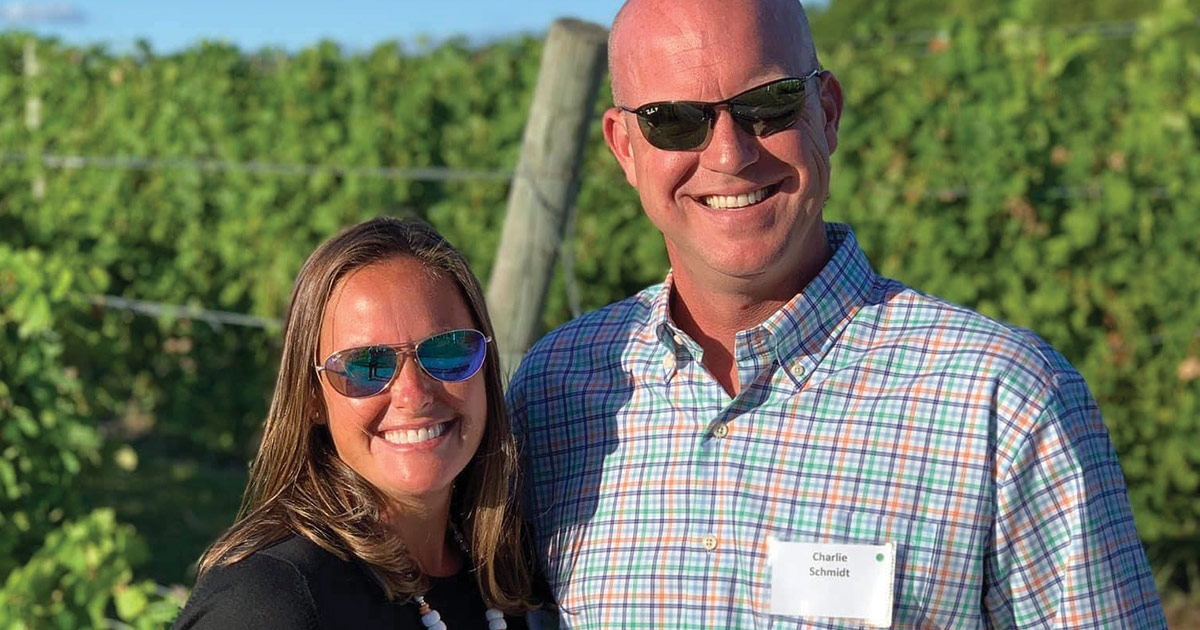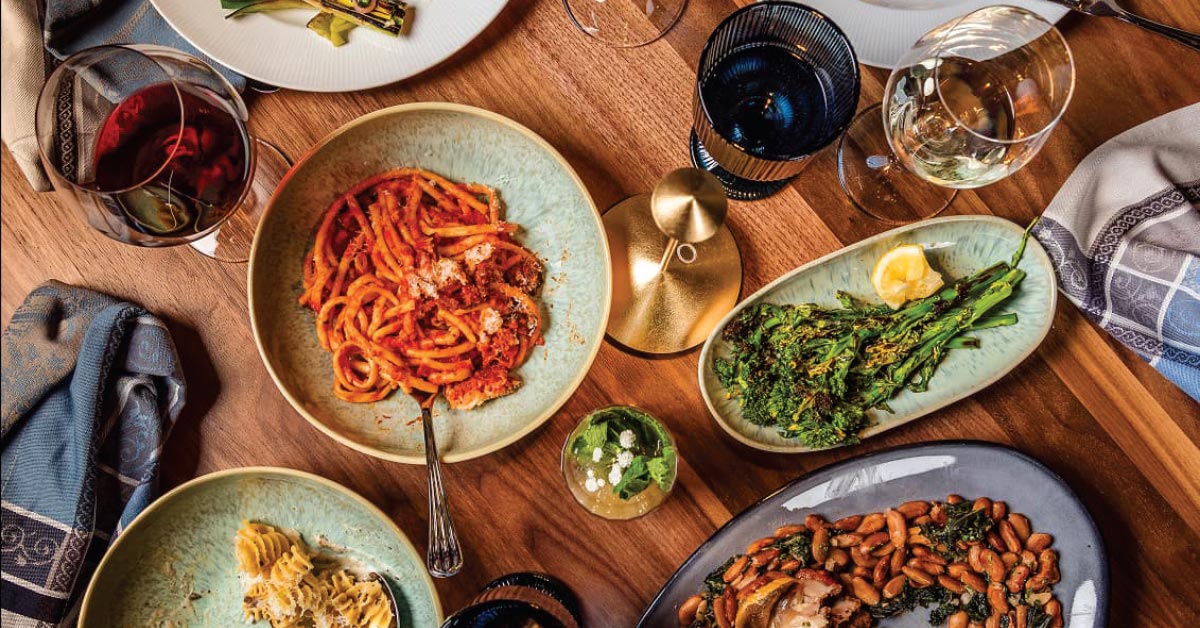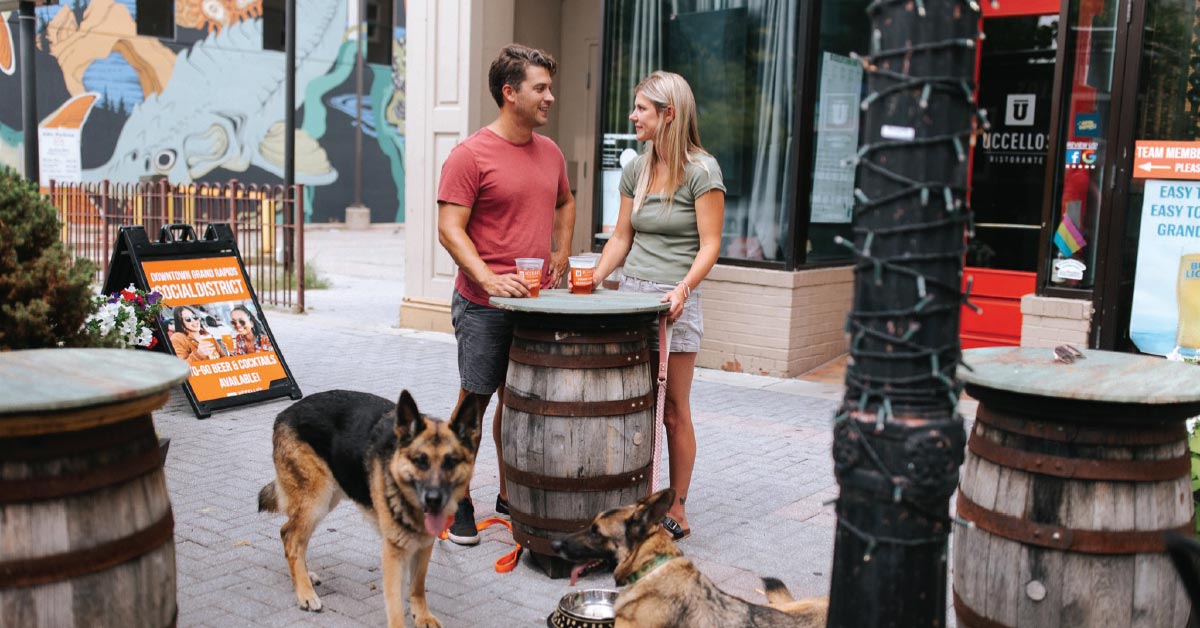As summer comes into view, many Michiganders will have wine tasting as part of their vacation plans. Seasoned wine aficionados and the oeno-curious alike have a lot to think about when venturing into the world of wine.
There’s a lot that goes into it, from navigating winemaking as a vintner to choosing wine as a consumer. To decipher all the nuances, we talked with Charlie Schmidt, an award-winning Leelanau County winemaker. Though Charlie didn’t grow up dreaming of being a winemaker, he became immersed in it in his college years and beyond, first by working in a tasting room, then taking classes and studying under other area winemakers, and eventually becoming head winemaker at French Road Cellars.
Here’s his take on all things wine.
What goes into making a great wine?
Aside from the starting product, the grape, a lot of it is about cap management. The cap is the yeast and foam that forms in the upper portion of the tank during fermentation. If you smell that on a daily basis, you can kind of tell what’s going on. At the beginning of fermentation, you have plenty of nutrients and sugar, and all the things that a good fermentation needs. At the end of fermentation, if you’re lacking any of that, there are different tastes and smells from the cap of the wine that can indicate if something’s going wrong. If you catch it early enough, you can add what’s needed to finish out a clean fermentation. Once you’ve gotten through that process, the rest of it is fairly simple; you’re just tweaking the wine to taste. If you’re physically in the winery, getting your head in the tank every day, then you’re going to end up with a good wine.
Have you ever had a disastrous outcome?
Not really. Up here—and I’m sure it’s similar in other regions—the winemakers all know each other, and if there’s an issue and you’re not sure how to deal with it, you can always call another winemaker. Most of the time someone has an answer. Everyone is willing to help each other for the most part because having a bad winery up here hurts our reputation as a region overall. So there’s a lot of back and forth and winemaker tastings where we all get together and troubleshoot and collaborate.
So, winemakers do have a lot of control and it isn’t all reliant on terroir and weather?
You can make really, really good wine out of what I’ll call subpar fruit. Winemakers up here are familiar enough with Michigan fruit to know how to deal with it if it’s unripe. You can also take good fruit and botch things up if you’re not paying attention. The fruit is important, but it’s not as important as the team who is dealing with that product.
With fluctuations in terroir and fruit quality, how do you maintain a consistent end product year over year?
It’s definitely possible, within reason. We try to get everyone’s wine as close as possible to the previous year, as long as that’s what they were aiming for. Brix is a term for the system of measuring sugar content in grapes. If you have underripe fruit, you have to add enough sugar for the yeast to produce plus or minus 12% alcohol. So you can deal with the first part of it by making you sure you have the proper sweetness level of your juice before fermentation. To get everything as similar as we can after fermentation, that’s when the owners of the different wineries come in and taste against a ton of different samples. We might take a wine from last year and use that as a control, and sometimes they’ll pick one that’s the closest; other times they might pick one they like better, even though it’s different.
What is your favorite part of the winemaking process?
That’s an interesting question because my favorite part of winemaking is also my least favorite time of the year—and that’s harvest. Harvest is when you get to see the end result from the entire vineyard crew. You get to see the fruit coming in and you get to deal with that initial fermentation. During harvest is when you’re working seven days a week, up to fourteen hours per day, for eight weeks straight. So it’s a brutal time of year but it’s also the best time. It’s when the majority of the hard work happens, but when we’re sure it’s all safe, everyone gets to take a sigh of relief.
Switching gears… What should consumers, especially someone who is new to wine, know about choosing a wine?
If you’re a beginner but you want to progress in the wine world, and in tasting and drinking wine, you need to find a good wine shop that has someone who works there who knows what they’re talking about and has sampled a lot. They can tell you from experience what a wine is going to taste like. When you look at the back of a label, it doesn’t always tell you the information you need—and you’re kind of going in blind. So start with good wine shop where you can trust what they’re telling you. And, as tempting as it is to go for the bottle with an attractive label, most of the time it’s not the best option. Same goes for wines with a high points rating. If it’s not your personal taste, then the points really mean nothing.
What else would you like to share?
When I started out, I dabbled in home winemaking and I just loved seeing the entire process, from planting vines to waiting three to four years to get fruit, and then taking that fruit and making a finished product. Wine is interesting. For most people, the farther you get into it, the more interesting it becomes, and the more you know about the process of winemaking.





